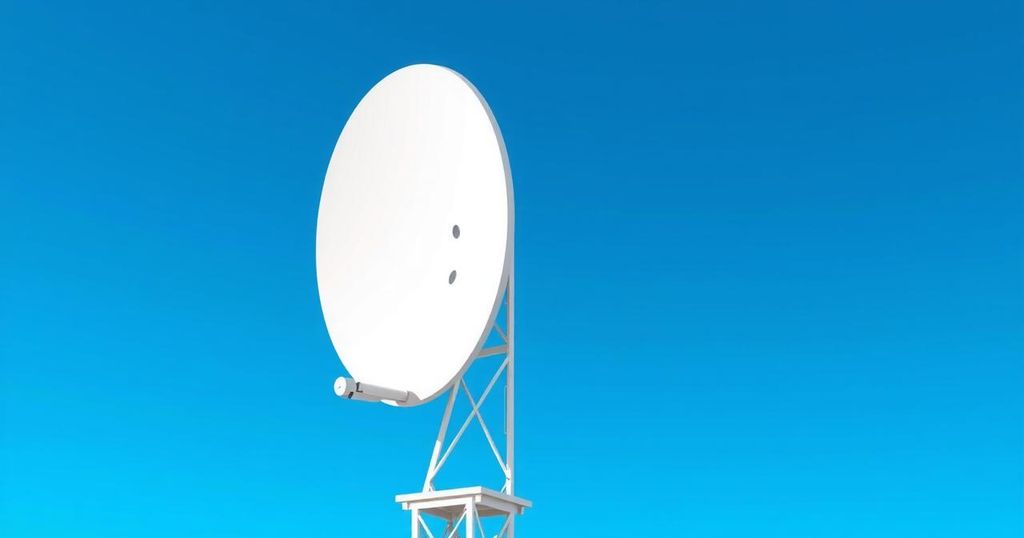Starlink has become Nigeria’s second-largest ISP, according to the NCC, overtaking FiberOne Broadband. The user base expanded from 23,897 in 2023 to 65,564 by the close of 2024. Although Spectranet remains the leading provider, it has experienced subscriber losses. Starlink’s ongoing expansion, in response to industry complaints about poor service, may redefine Nigeria’s broadband landscape amidst regulatory and pricing challenges.
Starlink, the satellite internet service operated by SpaceX, has emerged as Nigeria’s second-largest internet service provider (ISP), surpassing FiberOne Broadband Limited in the fourth quarter of 2024, as reported by the Nigerian Communications Commission (NCC). Despite its premium pricing, Starlink’s subscriber count surged from 23,897 in 2023 to 65,564 by the close of 2024, showcasing a rapid increase driven by a growing demand for high-speed internet, with speeds reaching up to 250 Mbps—significantly higher than those offered by many local ISPs.
Despite a decline in subscriber numbers, Spectranet retains its position as the market leader. According to NCC data, the company’s subscribers declined from 113,869 at the end of 2023 to 105,441 by the third quarter of 2024, a reduction of 8,428 users, with numbers holding steady in the fourth quarter. Unlike Starlink, which employs satellite technology, Spectranet relies on fiber and terrestrial wireless networks, which incur substantial costs associated with right-of-way fees and infrastructure maintenance.
Starlink’s rise is occurring amidst consumer frustrations with the insufficient quality of internet provided by mobile and local ISPs. By contrast, Starlink continues to expand its global satellite network, improving service speed, latency, and reliability. As of February 2025, SpaceX has launched a total of 8,039 Starlink satellites, of which 7,082 remain in orbit, and 7,049 are operational.
Ladi Okuneye, CEO of UniCloud ISP, remarked on Starlink’s significant growth, stating, “As far as them (Starlink) being the second-largest ISP now, it makes sense. Satellite technology’s ubiquitous nature means you can connect a customer today in Ikoyi and another in Ikot Ekpene without being restricted by the geographical limitations of fiber or terrestrial wireless solutions.”
In December 2024, Starlink announced an increase in its subscription fees in Nigeria, raising the monthly cost for standard residential services from ₦38,000 to ₦75,000. The new rates applied to new customers immediately, while existing customers were scheduled to transition to the new pricing on January 27, 2025. However, as demand grew, the implementation of the tariff adjustment was temporarily suspended.
Starlink has encountered previous pricing difficulties in Nigeria. In October 2024, the NCC halted an earlier attempt to increase tariffs, citing a lack of adherence to regulatory procedures. Although the NCC approved a price hike on February 4, 2024, allowing telecom operators to raise their rates, Starlink has yet to implement these increases while other operators like MTN Nigeria and Airtel Nigeria have done so.
Nevertheless, Starlink’s expansion is not without limitations. The current service model requires subscribers to remain in a fixed location, presenting challenges for mobile users seeking continual connectivity. In 2024, Starlink initiated the rollout of satellite-to-phone connectivity to address mobile dead zones, but this service is not yet available in Africa.
Starlink’s expanding role in Nigeria underscores a significant evolution in the nation’s broadband market. However, its future success may hinge on navigating regulatory challenges, addressing pricing issues, and enhancing mobile connectivity options.
In summary, Starlink has rapidly ascended to become Nigeria’s second-largest ISP, indicating a shifting landscape in internet provision. With a substantial subscriber increase driven by a demand for high-speed connectivity, the service’s growth is accompanied by challenges such as regulatory hurdles and pricing concerns. Furthermore, the service’s current limitations in mobile connectivity pose an obstacle that Starlink must overcome for sustained success in the Nigerian market.
Original Source: techcabal.com






